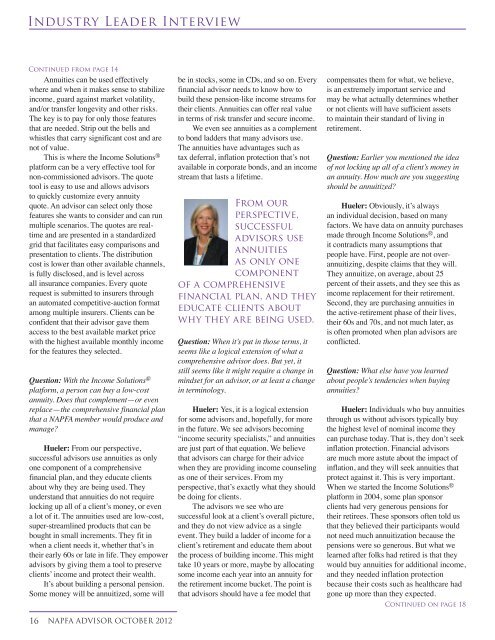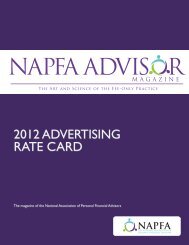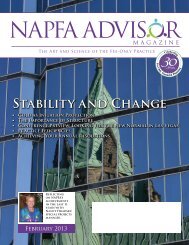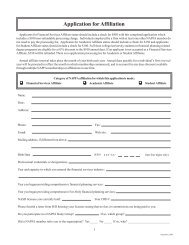Q&A with Kelli Hueler: - Napfa
Q&A with Kelli Hueler: - Napfa
Q&A with Kelli Hueler: - Napfa
Create successful ePaper yourself
Turn your PDF publications into a flip-book with our unique Google optimized e-Paper software.
Industry Leader Interview<br />
Continued from page 14<br />
Annuities can be used effectively<br />
where and when it makes sense to stabilize<br />
income, guard against market volatility,<br />
and/or transfer longevity and other risks.<br />
The key is to pay for only those features<br />
that are needed. Strip out the bells and<br />
whistles that carry significant cost and are<br />
not of value.<br />
This is where the Income Solutions ®<br />
platform can be a very effective tool for<br />
non-commissioned advisors. The quote<br />
tool is easy to use and allows advisors<br />
to quickly customize every annuity<br />
quote. An advisor can select only those<br />
features she wants to consider and can run<br />
multiple scenarios. The quotes are realtime<br />
and are presented in a standardized<br />
grid that facilitates easy comparisons and<br />
presentation to clients. The distribution<br />
cost is lower than other available channels,<br />
is fully disclosed, and is level across<br />
all insurance companies. Every quote<br />
request is submitted to insurers through<br />
an automated competitive-auction format<br />
among multiple insurers. Clients can be<br />
confident that their advisor gave them<br />
access to the best available market price<br />
<strong>with</strong> the highest available monthly income<br />
for the features they selected.<br />
Question: With the Income Solutions ®<br />
platform, a person can buy a low-cost<br />
annuity. Does that complement—or even<br />
replace—the comprehensive financial plan<br />
that a NAPFA member would produce and<br />
manage?<br />
<strong>Hueler</strong>: From our perspective,<br />
successful advisors use annuities as only<br />
one component of a comprehensive<br />
financial plan, and they educate clients<br />
about why they are being used. They<br />
understand that annuities do not require<br />
locking up all of a client’s money, or even<br />
a lot of it. The annuities used are low-cost,<br />
super-streamlined products that can be<br />
bought in small increments. They fit in<br />
when a client needs it, whether that’s in<br />
their early 60s or late in life. They empower<br />
advisors by giving them a tool to preserve<br />
clients’ income and protect their wealth.<br />
It’s about building a personal pension.<br />
Some money will be annuitized, some will<br />
be in stocks, some in CDs, and so on. Every<br />
financial advisor needs to know how to<br />
build these pension-like income streams for<br />
their clients. Annuities can offer real value<br />
in terms of risk transfer and secure income.<br />
We even see annuities as a complement<br />
to bond ladders that many advisors use.<br />
The annuities have advantages such as<br />
tax deferral, inflation protection that’s not<br />
available in corporate bonds, and an income<br />
stream that lasts a lifetime.<br />
From our<br />
perspective,<br />
successful<br />
advisors use<br />
annuities<br />
as only one<br />
component<br />
of a comprehensive<br />
financial plan, and they<br />
educate clients about<br />
why they are being used.<br />
Question: When it’s put in those terms, it<br />
seems like a logical extension of what a<br />
comprehensive advisor does. But yet, it<br />
still seems like it might require a change in<br />
mindset for an advisor, or at least a change<br />
in terminology.<br />
<strong>Hueler</strong>: Yes, it is a logical extension<br />
for some advisors and, hopefully, for more<br />
in the future. We see advisors becoming<br />
“income security specialists,” and annuities<br />
are just part of that equation. We believe<br />
that advisors can charge for their advice<br />
when they are providing income counseling<br />
as one of their services. From my<br />
perspective, that’s exactly what they should<br />
be doing for clients.<br />
The advisors we see who are<br />
successful look at a client’s overall picture,<br />
and they do not view advice as a single<br />
event. They build a ladder of income for a<br />
client’s retirement and educate them about<br />
the process of building income. This might<br />
take 10 years or more, maybe by allocating<br />
some income each year into an annuity for<br />
the retirement income bucket. The point is<br />
that advisors should have a fee model that<br />
compensates them for what, we believe,<br />
is an extremely important service and<br />
may be what actually determines whether<br />
or not clients will have sufficient assets<br />
to maintain their standard of living in<br />
retirement.<br />
Question: Earlier you mentioned the idea<br />
of not locking up all of a client’s money in<br />
an annuity. How much are you suggesting<br />
should be annuitized?<br />
<strong>Hueler</strong>: Obviously, it’s always<br />
an individual decision, based on many<br />
factors. We have data on annuity purchases<br />
made through Income Solutions ® , and<br />
it contradicts many assumptions that<br />
people have. First, people are not overannuitizing,<br />
despite claims that they will.<br />
They annuitize, on average, about 25<br />
percent of their assets, and they see this as<br />
income replacement for their retirement.<br />
Second, they are purchasing annuities in<br />
the active-retirement phase of their lives,<br />
their 60s and 70s, and not much later, as<br />
is often promoted when plan advisors are<br />
conflicted.<br />
Question: What else have you learned<br />
about people’s tendencies when buying<br />
annuities?<br />
<strong>Hueler</strong>: Individuals who buy annuities<br />
through us <strong>with</strong>out advisors typically buy<br />
the highest level of nominal income they<br />
can purchase today. That is, they don’t seek<br />
inflation protection. Financial advisors<br />
are much more astute about the impact of<br />
inflation, and they will seek annuities that<br />
protect against it. This is very important.<br />
When we started the Income Solutions ®<br />
platform in 2004, some plan sponsor<br />
clients had very generous pensions for<br />
their retirees. These sponsors often told us<br />
that they believed their participants would<br />
not need much annuitization because the<br />
pensions were so generous. But what we<br />
learned after folks had retired is that they<br />
would buy annuities for additional income,<br />
and they needed inflation protection<br />
because their costs such as healthcare had<br />
gone up more than they expected.<br />
Continued on page 18<br />
16<br />
<strong>Napfa</strong> Advisor October 2012







